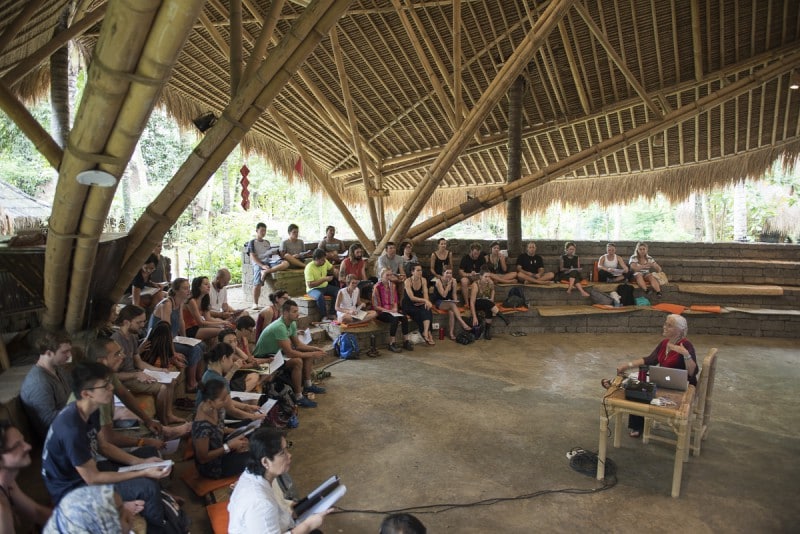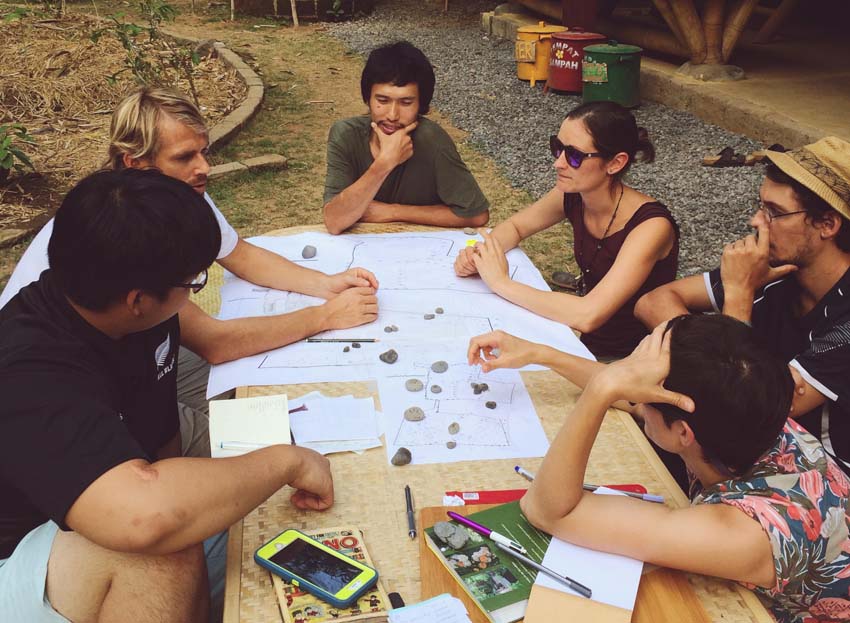Join a Permaculture Design Course (PDC) for a multi-cultural experience learning permaculture design, natural building, and traditional knowledge. Learn practical principles and strategies in permaculture whilst meeting amazing people in one of the most abundant permaculture settings in the world. You will be introduced to local Balinese farmers that have for decades interwoven permaculture principles into their cultural and agricultural practices. Join a growing movement of hundreds of thousands of people in Bali and worldwide dedicated to fostering positive ecologically based solutions of how we provide for ourselves and the environment.
WHAT YOU WILL LEARN:
The 2 week PDC includes an Introduction to Permaculture and workshops on bio-intensive growing, bamboo building, soil fertility, agroforestry and many more. You will be immersed into Balinese culture; we will open the course with a Balinese blessing, you’ll meet and learn from local rice farmers about the ecologically sustainable water management and intricate irrigation system for rice paddies in Bali called the Subak, that was listed a UNESCO World Heritage site in 2012. You will learn how local rice farmers relate to the natural world and how they see nature, humanity and spirit intrinsically linked through a philosophy called Tri Hita Karana.
You will be given a personalized tour of Green School and Green Village. You will learn about bamboo, this wild grass, that we are using here to build some of the most sustainable and beautiful homes and classrooms in the world. You will learn different ecological food production systems in Green School’s bamboo Aquaponics that was designed by Orin and his team at IBUKU gardens. You will learn how to follow the design process and create onsite designs at Green School and The Kul Kul Farm. The course will be split into classroom time, tours and hands-on workshops that will include building with bamboo, planting a food garden, making compost, propagating plants, sheet mulching and more!
WHO SHOULD TAKE THIS COURSE?
The course is suitable for anyone interested primarily in becoming an ecological designer. People apply permaculture design to their livelihoods, homes and gardens as well as helping facilitate positive change in their communities.
Permaculture provides an effective solution-based design system to address the problems of today. Based on a set of principles and natural patterning, permaculture design is applicable in all climate conditions; in both urban and rural situations. Many indigenous communities who have been relocated or disconnected from their home are studying permaculture design principles to help re-weave cultural connection and relationship.
SITE TOURS:
During the course you will get an inside tour into the inspiring Green School and Green Village. Lectures and workshops will be held on the Green School campus itself as well as at The Kul Kul Farm. On one of the days you will experience the Subak (Bali’s irrigation management system) up close and personal by trekking through Bali’s rice fields, irrigation canals and tunnels that were carved by hand thousands of years ago. We will also have a number of local Balinese farmers and guest speakers join us to share their vast knowledge, experience and skill.
The globally recognized permaculture design curriculum will give you the chance to learn and live permaculture on The Kul Kul Farm. Here’s more of what you’ll learn:
Water harvesting and Earth Works
Site analysis (Sector Analysis)
Site planning and Layout (Zoning)
Climate and micro-climate strategies- Tropical, Temperate, Dryland and Humid Climates
Mapping
Land access
Community building
Plant guilds
Soil Carbon Sequestration and Biochar
Food forests and agroforestry
The design process, principles, strategies, and techniques
Soil building and sheet mulching
Pond management and ecology
Bamboo building
Grey water systems
Bioremediation
Renewable energy systems
Watershed management
Economy and Equity
Group work on a conceptual design project.
Whether you’re interested in growing food in pots on your balcony, designing a kitchen garden, starting community garden, developing techniques to reduce waste and energy consumption or you may have a larger professional project in mind, this course will improve your ability to understand and interact with your local environment and give you the inspiration, knowledge and confidence to create great permaculture designs.
WHERE YOU WILL STAY
Your ticket includes a camping space on the farm, a tent, mattress, pillow and sheets. Upgrades on accommodation for a shared room are also available. All participants are required to stay on site during the course.
WHAT YOU’LL EAT
During the course you will eat like a king, or at least a vegetable king. We do our best to provide quality local ‘off the land’ ingredients to make delicious and authentic Balinese meals as well as a few international options. We cater to vegetarians, vegans & people who don’t eat wheat or gluten.
YOUR TEACHERS
IAN LILLINGTON: LEAD FACILITATOR
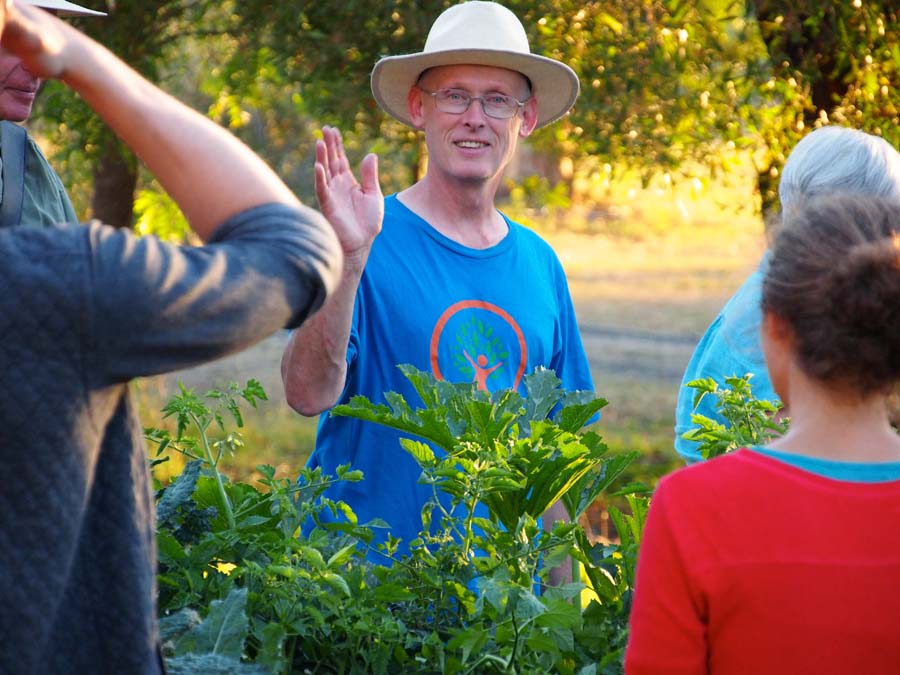
Ian Lillington is a permaculture teacher, author, sustainability activist and is a leader of the international team ‘Permaculture’s Next Big Step’. Based in Castlemaine, Victoria, in the SE of Australia, Ian is developing his own food forest and is involved in the local permaculture/transition town project called ‘Growing Abundance’. Ian is author of an introduction to permaculture – “The Holistic Life – a Beginners’ Guide to Permaculture”, and is editor of many of David Holmgren’s books, especially ‘Permaculture Principles and Pathways Beyond Sustainability’. He’s also featured in the anthology – “Permaculture Pioneers” and wrote the chapter on Permaculture in the “Encyclopedia of Sustainability” Ian participated in the recent International Conference in London, and co-organsied the Australian Permaculture Conference in Tasmania in March 2015. Ian has worked at CERES in Melbourne, for the National Centre for Sustainability, and also with the environment shop and “Greener Houses”, a project that promotes eco-retrofits of suburban houses in Melbourne. In the mid 1990’s, Ian designed and managed the building of a solar/eco home from rammed earth and recycled materials in South Australia, and a similar project in 2008 with a house made from regular brick veneer. Ian and his partner Marita build energy efficient homes and eco-renovate older houses by adding insulation, solar panels, rainwater tanks and orchards. Ian is passionate about agroforestry and natural building, and when asked what his favourite topic to teach in a PDC, was, he outlined the importance of social permaculture and his passion of applying permaculture’s ethics and principles to every aspect of life.
JODI ROEBUCK | BIOINTENSIVE GARDENING
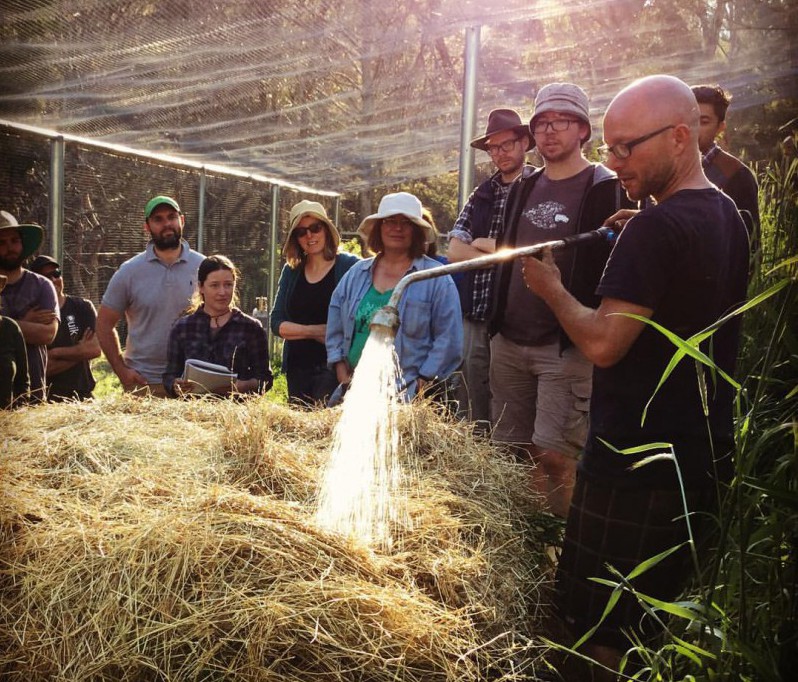
Bio-intensive grower, farmer of heritage seed and educator. Jodi lives and grows in New Zealand, on a thriving small farm with his partner Tanya and two daughters. He was mentored and comes highly recommended by biointensive gardening originator John Jeavons. Jodi will be bringing his expertise to our PDC for the weekend of the 15th &16th July where he will teach how to take growing food to the next level, using less space whilst gaining higher yields. This weekend workshop will be open to the public and can be booked as a stand alone workshop.
SCOTT GODFREDSON | PROFESSIONAL PERMACULTURE DESIGN
Scott holds an honours degree in Landscape Architecture from RMIT Melbourne. He chose Landscape Architecture as a profession because of its ability to artistically and creatively work with the environment at all levels. He has been actively involved in Permaculture design and education since 2000, subsequently lecturing on the topic in Australia, United States and Central America. With a strong focus on Permaculture master planning and sustainable community design, Scott’s involvement in projects have taken him around Australia and overseas to Hawaii, California, Panama, Costa Rica and England designing farm communities, community visioning, eco-retreat and eco-village projects. Over the last decade Scott has gained a diverse range of skills working on projects including private residential projects, commercial developments, urban master planning, resorts, highway projects, public parks, community gardens and botanic gardens.
ORIN HARDY | PERMACULTURE IN PRACTICE
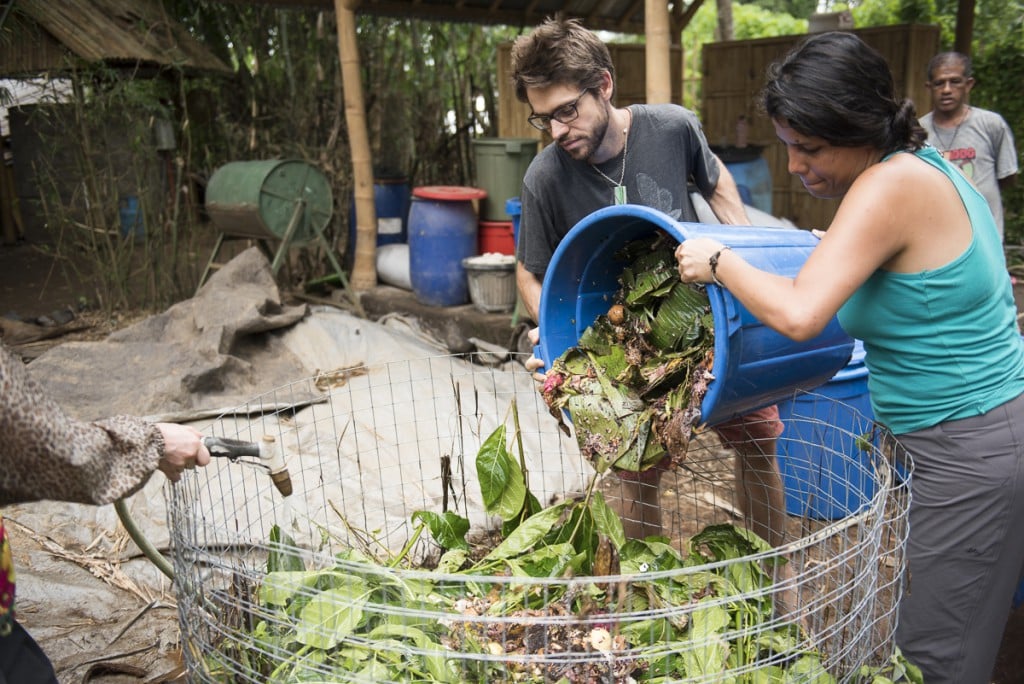 Orin was first introduced to Permaculture when he was 16 years old by Penny Livingston and James Stark. Since then he has done courses in Permaculture with Dave Jackie at Milkwood, Penny Livingston and James Stark at the Regenerative Design Institute and Paul Taylor at Jambaroo Farms. After graduating from the Evergreen State College in Olympia Washington, he returned to Bali in 2012 and started IBUKU Gardens, a landscape design group that is part of IBUKU. His goal was to replace landscaping plants with edibles in homes and resorts around Bali. Over the past 2 years he has bestowed vegetable gardens on a variety of private and resort gardens. Orin is the son of Green School co-founder John Hardy and is the younger brother of Elora Hardy, creative director of IBUKU (design firm behind the magic and beauty of everything bamboo in Bali). The Kul Kul Farm is a culmination of his years of studying permaculture and implementing regenerative food systems here in Bali and exploring its relationship to people and communities.
Orin was first introduced to Permaculture when he was 16 years old by Penny Livingston and James Stark. Since then he has done courses in Permaculture with Dave Jackie at Milkwood, Penny Livingston and James Stark at the Regenerative Design Institute and Paul Taylor at Jambaroo Farms. After graduating from the Evergreen State College in Olympia Washington, he returned to Bali in 2012 and started IBUKU Gardens, a landscape design group that is part of IBUKU. His goal was to replace landscaping plants with edibles in homes and resorts around Bali. Over the past 2 years he has bestowed vegetable gardens on a variety of private and resort gardens. Orin is the son of Green School co-founder John Hardy and is the younger brother of Elora Hardy, creative director of IBUKU (design firm behind the magic and beauty of everything bamboo in Bali). The Kul Kul Farm is a culmination of his years of studying permaculture and implementing regenerative food systems here in Bali and exploring its relationship to people and communities.
Other guest speakers (we have many) will be announced at a later date. They will include Green School community members/ heads, local social entrepreneurs, local farmers, Ibuku architects and others.
INCLUDED IN YOUR COURSE FEE
Your course ticket includes camping, meals, tours and excursions, materials and a range of take-home resources to help you in continuing your permaculture journey back home.
CANCELLATIONS AND REFUNDS
We get that sometimes things happen and you may not be able to attend the course you paid for. Unless otherwise stated, only if you you let us know at least 30 days before the start of the course will we give you a credit note less an admin fee of USD$150 to be used by you for a future course or workshop at the farm.
BOOKINGS
If the following booking form does not work please book by clicking here. Bookings will close once we have a maximum of 35 participants. For other enquiries email maria@kulkulfarm.com or call +62 811 389 6070.

